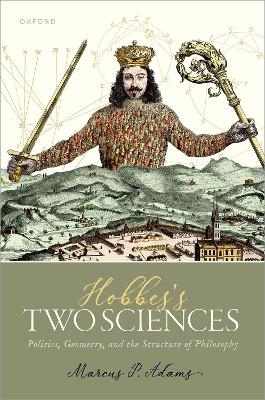
Hobbes's Two Sciences
Politics, Geometry, and the Structure of Philosophy
Seiten
2025
Oxford University Press (Verlag)
978-0-19-892468-5 (ISBN)
Oxford University Press (Verlag)
978-0-19-892468-5 (ISBN)
- Noch nicht erschienen (ca. März 2025)
- Versandkostenfrei
- Auch auf Rechnung
- Artikel merken
Is politics a science? Hobbes's Two Sciences explores how Seventeenth Century Philosopher Thomas Hobbes answered this question in the affirmative by developing a novel theory of knowledge and by finding inspiration in the methods of mathematics and physics.
Seventeenth-Century Thinker Thomas Hobbes maintained that his philosophy constituted a unified system, but in what precise sense did he think that the branches of his philosophy were unified? This question has provoked extensive scholarship over the last half-century. Answering it is essential not only to understanding Hobbes's philosophy generally, but how one answers it significantly impacts our understanding of the Leviathan, his most influential work, and of the Laws of Nature, the foundation of his political philosophy.
Hobbes's Two Sciences answers the question of philosophical unificiation by situating Hobbes's politics within his account of scientific knowledge as constructed by humans—an epistemology founded on the idea that makers have special access to causal knowledge—and by demonstrating that the relationship between pure and mixed mathematics provided him with a model for thinking about relationships between geometry and natural philosophy and between politics and history. Marcus P. Adams explores how this understanding of Hobbes's systematic philosophy impacts three long-standing areas of scholarship on Hobbes and the History of Early Modern Philosophy and provides a new view on Hobbes's system .
Seventeenth-Century Thinker Thomas Hobbes maintained that his philosophy constituted a unified system, but in what precise sense did he think that the branches of his philosophy were unified? This question has provoked extensive scholarship over the last half-century. Answering it is essential not only to understanding Hobbes's philosophy generally, but how one answers it significantly impacts our understanding of the Leviathan, his most influential work, and of the Laws of Nature, the foundation of his political philosophy.
Hobbes's Two Sciences answers the question of philosophical unificiation by situating Hobbes's politics within his account of scientific knowledge as constructed by humans—an epistemology founded on the idea that makers have special access to causal knowledge—and by demonstrating that the relationship between pure and mixed mathematics provided him with a model for thinking about relationships between geometry and natural philosophy and between politics and history. Marcus P. Adams explores how this understanding of Hobbes's systematic philosophy impacts three long-standing areas of scholarship on Hobbes and the History of Early Modern Philosophy and provides a new view on Hobbes's system .
Marcus P. Adams is Associate Professor of Philosophy at the State University of New York at Albany and former Associate Editor of the journal Hobbes Studies. His research focuses on perception and natural philosophy in Early Modern Philosophy, in particular these areas in the thought of Thomas Hobbes and Margaret Cavendish. He has edited A Companion to Hobbes (2021), and his papers have appeared in journals such as British Journal for the History of Philosophy, History of Philosophy Quarterly, and Philosophers' Imprint.
| Erscheint lt. Verlag | 27.3.2025 |
|---|---|
| Verlagsort | Oxford |
| Sprache | englisch |
| Maße | 156 x 234 mm |
| Themenwelt | Geisteswissenschaften ► Philosophie ► Geschichte der Philosophie |
| Geisteswissenschaften ► Philosophie ► Philosophie der Neuzeit | |
| Naturwissenschaften | |
| Sozialwissenschaften ► Politik / Verwaltung ► Politische Theorie | |
| ISBN-10 | 0-19-892468-2 / 0198924682 |
| ISBN-13 | 978-0-19-892468-5 / 9780198924685 |
| Zustand | Neuware |
| Informationen gemäß Produktsicherheitsverordnung (GPSR) | |
| Haben Sie eine Frage zum Produkt? |
Mehr entdecken
aus dem Bereich
aus dem Bereich
eine Geschichte der Zuversicht von Homer bis zum Klimawandel
Buch | Hardcover (2024)
C.H.Beck (Verlag)
CHF 39,20
die kolonialen Wurzeln der französischen Theorie
Buch | Hardcover (2024)
Matthes & Seitz Berlin (Verlag)
CHF 41,90


